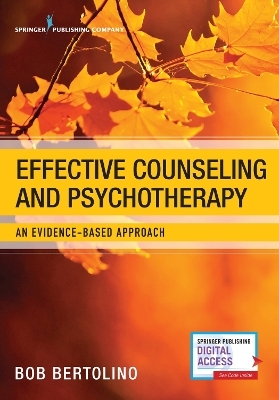
Effective Counseling and Psychotherapy
Springer Publishing Co Inc (Verlag)
978-0-8261-4112-5 (ISBN)
Grounded in over 50 years of outcome research, this comprehensive textbook focuses on outcomes management and the principles and core strategies for delivering competent and effective therapeutic practice. Applicable to all settings and models, the text illuminates four foundational principles of therapeutic practice: a strengths-based framework, collaborative practice, clinician effectiveness, and routine and ongoing outcome-oriented clinical work.
The book presents strategies for identifying, evoking, and using client strengths to promote behavioral health. It focuses on the importance of client engagement during initial interactions and describes advanced listening and attending strategies for strengthening the clinical alliance. A chapter titled “Matching and Classes of Interventions” examines important processes for increasing client fit and improving treatment outcome. Clinical dialogues, vignettes, sample questions, anecdotes, practice exercises, printable forms, and online resources help to reinforce content. An appendix provides additional insights into outcome measures, graphs, and charts covered within the book, and a robust instructor packet includes an instructor’s manual, PowerPoint slides, a test bank, and student exercises.
Key Features:
Describes current research and practice strategies for tracking therapeutic effectiveness
Underscores the fundamental principles and core strategies for delivering effective therapy
Provides specific, evidence-based ways to improve the benefit of therapy and therapist effectiveness
Presents strategies for identifying, evoking, and using client strengths to promote behavioral health
Delivers proven methods for monitoring client progress
Includes clinical dialogues, vignettes, sample questions, practice exercises, printable forms, and online resources
Provides instructor’s manual, PowerPoint slides, and test bank, as well as a free digital ebook
Bob Bertolino, PhD, is Professor of Rehabilitation Counseling, Maryville University; Senior Clinical Advisor, Youth In Need, Inc.; and a Senior Associate; International Center for Clinical Excellence.
Contents
Contributors
Preface
Acknowledgments
1. The Influence of the Therapist
An Evolution in Psychotherapy?
The Good News, Bad News Conundrum
An Evolution in Context
Methods, Models, and Techniques
Training and Supervision
Exploring Therapist Performance
Therapist Effects
2. Principles and Core Strategies of Effective Therapy
Evidence-Based Practice and Empirically Supported Treatments: One and the Same?
Defining Evidence-Based Practice
Common Factors: A Brief History and Conundrum
Evolving From the Common Factors
The Third Wave: A Strengths-Based Perspective
Strengths-Based Principles: From Evidence to Practice
Putting the Pieces Together: Qualities and Actions of Effective Therapists
3. Early Client Engagement
The Alliance–Outcome Correlation
A Few Words About Words: Strengths-Based Language and Conversations
Strengthening the Alliance Through Collaboration Keys
4. Active Client Engagement (ACE): Information-Gathering Processes
The 80/20 Rule in Action: Preparing for Change
Strengths-Based Information Gathering
Process 1: ROM in Practice: Partners for Change Outcome Management System
Process 2: Interviewing for Strengths
5. Therapeutic Conversations for Achieving Structure and Direction
Funneling: Bringing Focus to Therapeutic Conversations
Advanced Listening and Attending Skills: Using Language to Strengthen the Alliance and Create Possibilities
6. Matching and Classes of Intervention
The I-Am Approach to Client Orientations
Matching: Increasing the Factor of Fit
The Path to Models: A Brief Summary
From Philosophy to Theory to Practice
Classes of Problems/Classes of Intervention: Selecting Models
7. Client Progress and the Benefits of Therapy
The Progression of Therapy in Future Sessions
Category 1: Unimprovement or Deterioration
Responses to Unimprovement and Deterioration
Category 2: Improvement
Revisiting Goals and Outcomes: The Meaning of Progress
Transition From Therapy
8. Professional Development and Clinical Excellence
Understanding Therapist Effectiveness
The Road to Excellence: Natural and Talented?
Cycle of Excellence
Strategies for Practice to Improve Therapeutic Effectiveness
Deliberate Practice in Context
Future-Forward: Supervision Revisited
The Path to Excellence
Index
| Erscheinungsdatum | 29.03.2018 |
|---|---|
| Verlagsort | New York |
| Sprache | englisch |
| Maße | 178 x 254 mm |
| Themenwelt | Geisteswissenschaften ► Psychologie |
| Medizin / Pharmazie ► Medizinische Fachgebiete ► Psychiatrie / Psychotherapie | |
| Medizin / Pharmazie ► Physiotherapie / Ergotherapie ► Rehabilitation | |
| Sozialwissenschaften ► Soziologie | |
| ISBN-10 | 0-8261-4112-9 / 0826141129 |
| ISBN-13 | 978-0-8261-4112-5 / 9780826141125 |
| Zustand | Neuware |
| Informationen gemäß Produktsicherheitsverordnung (GPSR) | |
| Haben Sie eine Frage zum Produkt? |
aus dem Bereich


